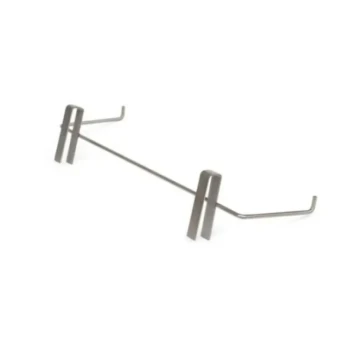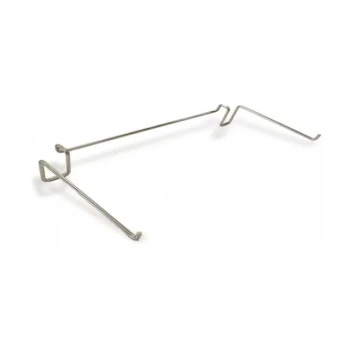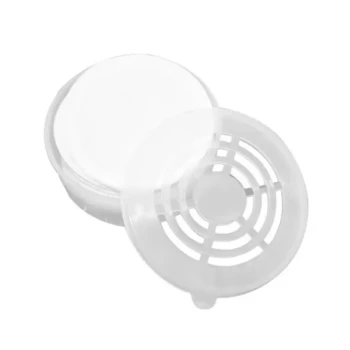Yes, it is possible to be a beekeeper even if you are allergic to bee stings, but it requires a profound commitment to safety and a clear understanding of your specific medical condition. Many successful beekeepers manage allergies, but they do so by treating the risk with the seriousness it deserves and implementing rigorous, non-negotiable safety protocols. This is not a casual hobby for someone with a known allergy; it is a discipline.
The decision to keep bees with an allergy hinges on one critical factor: knowing the precise nature of your allergic reaction. Your success and safety depend entirely on distinguishing between a normal local reaction and a dangerous systemic one, and then building an ironclad safety plan with medical guidance.
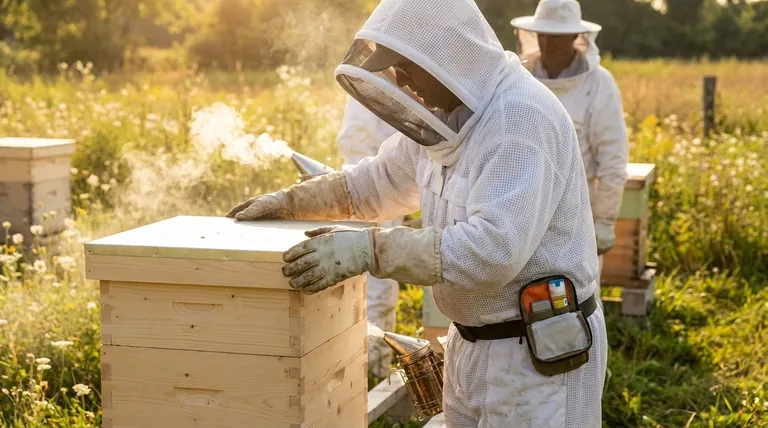
Understanding Your Allergic Reaction
Before you buy a hive or a bee suit, your first step is to understand what "allergic" means for you. Not all reactions are the same, and the differences are life-or-death. You must consult an allergist for proper testing and diagnosis.
Normal Local Reactions
This is the most common response to a bee sting, experienced by nearly everyone. Symptoms are confined to the sting site and include sharp pain, redness, swelling, and itching. This is your body's normal inflammatory response to the foreign venom and is not a true allergy.
Large Local Reactions (LLRs)
An LLR is a more significant version of a normal reaction. The swelling extends far beyond the sting site, often peaking 24-48 hours later. For example, a sting on the hand might cause the entire arm to swell. While uncomfortable and alarming, LLRs are typically not life-threatening.
Systemic (Anaphylactic) Reactions
This is a true, life-threatening allergy. A systemic reaction involves the entire body, as your immune system overreacts to the venom. Symptoms appear rapidly and can include hives, flushing, difficulty breathing, swelling of the throat or tongue, a rapid drop in blood pressure, dizziness, and loss of consciousness. This is a medical emergency.
The Non-Negotiable Safety Protocol
If you and your doctor determine it is acceptable to proceed, you must adopt a safety-first mindset. For an allergic beekeeper, these are not recommendations; they are rules.
Partner with Your Allergist
This is your most important relationship. Your allergist can confirm your allergy type, prescribe emergency medication, and may even discuss options like venom immunotherapy (allergy shots), which can desensitize you to bee venom over time.
Master Your Protective Gear
Invest in the best possible gear. This means a full, ventilated bee suit, sealed gloves (not cloth), and boots that the suit can be tucked into securely. Before every hive inspection, meticulously check your gear for any holes or weak points. Never cut corners on your protective equipment.
Always Carry Emergency Medication
If you have a history of systemic reactions, you must have an epinephrine auto-injector (like an EpiPen) with you at all times—especially near your hives. You must know how to use it, and it must not be expired.
Never Keep Bees Alone
Especially when you are starting, always have a "bee buddy" with you. This person must be aware of your allergy, know the signs of a systemic reaction, and know how to administer your EpiPen and call for emergency services.
Work with Gentle Bees
Genetics matter. Choose a bee stock known for its calm, gentle temperament, such as Carniolans or Buckfast bees. While any hive can become defensive, starting with a gentler line significantly reduces the likelihood of stings.
Understanding the Trade-offs
Beekeeping with an allergy is a fundamentally different experience. You must be realistic about the compromises involved.
The Loss of Spontaneity
You can't just casually pop the top on a hive. Every interaction must be planned, with full gear and safety checks. This adds a layer of formality and removes some of the relaxed nature that other beekeepers enjoy.
The Constant Vigilance
You must remain acutely aware of your body's response to any sting. What might be a simple sting for another beekeeper is a data point for you to monitor carefully. This requires a level of mental and emotional energy.
The Financial Investment
Proper medical consultation, allergy testing, high-quality protective gear, and emergency medications represent a significant upfront and ongoing cost. This is not an area where you can afford to economize.
Making the Right Choice for Your Goal
Your path forward depends entirely on your medical situation and your tolerance for risk.
- If you only experience normal or large local reactions: You can likely proceed with caution, focusing on excellent protective gear and calm hive management techniques.
- If you have a confirmed systemic (anaphylactic) allergy: This path is extremely high-risk and should only be considered in a deep partnership with your allergist, likely including venom immunotherapy and an ironclad emergency plan.
Ultimately, your safety is the only priority that matters.
Summary Table:
| Reaction Type | Symptoms | Risk Level | Action Required |
|---|---|---|---|
| Normal Local | Pain, redness, swelling at sting site | Low | Standard first aid |
| Large Local (LLR) | Extensive swelling beyond sting site | Moderate | Monitor closely; consult doctor |
| Systemic (Anaphylactic) | Hives, breathing difficulty, throat swelling | High (Life-threatening) | Use EpiPen; seek immediate emergency care |
Ready to Start Your Beekeeping Journey Safely?
Whether you're a commercial apiary or a beekeeping equipment distributor, having the right protective gear is the first step to safe and successful beekeeping. HONESTBEE supplies professional-grade beekeeping supplies and equipment designed for maximum safety and durability.
We help you:
- Protect Your Investment: High-quality bee suits, sealed gloves, and ventilated jackets to minimize sting risks.
- Ensure Hive Success: Durable equipment and gentle hive management tools for productive apiaries.
- Scale Your Operations: Wholesale-focused solutions for commercial beekeepers and distributors.
Don't let allergies hold you back. Let's discuss the right equipment for your needs.
Contact HONESTBEE today for a consultation
Visual Guide
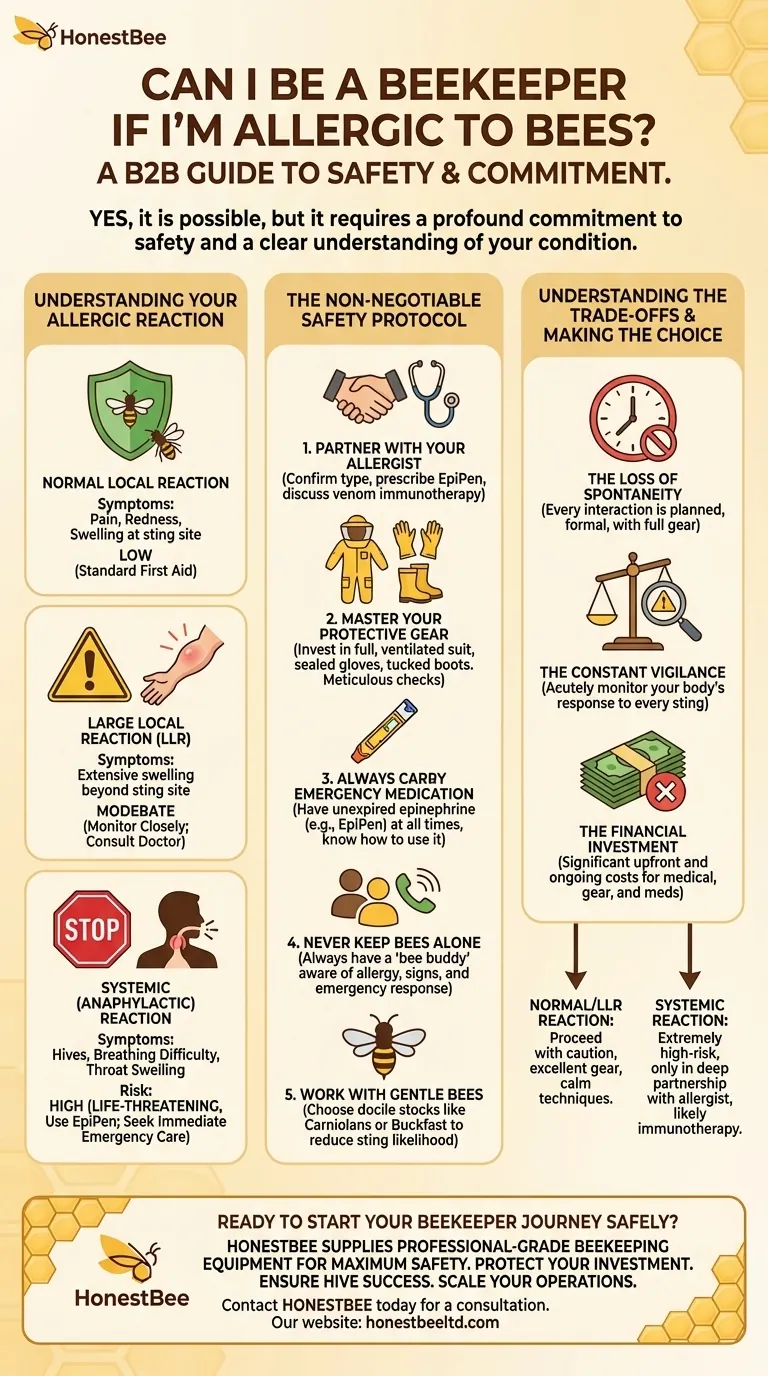
Related Products
- Wholesales Dadant Size Wooden Bee Hives for Beekeeping
- Yellow Plastic Bucket Pail Perch for Beekeeping
- Heavy-Duty Stainless Steel Clip-On Frame Perch
- Long Langstroth Style Horizontal Top Bar Hive for Wholesale
- Professional Insulated Winter Hive Wrap for Beekeeping
People Also Ask
- How does the use of professional beekeeping suits serve as a fire prevention measure in sustainable honey harvesting?
- What characteristics define an ultra-ventilated three-layer beekeeping suit? Discover Top Sting-Proof Comfort
- Are bee suits one-size-fits-all? Why Proper Sizing is Critical for Beekeeper Safety
- Are bee suits wasp-proof? Maximize Your Protection Against Stings
- How do professional beekeepers not get stung? Master Bee Behavior & Proactive Techniques
- What level of protection does a beekeeping jacket provide? Balance Safety and Mobility in the Apiary
- Should a new beekeeper choose a suit or a jacket? The Ultimate Beginner's Guide to Protective Gear
- How does the availability of professional protective wear and ladders impact the scalability of apiary management?


